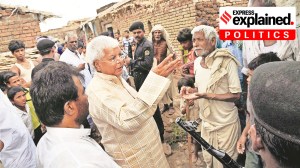Lawyers turn to translations for competent arguments
PUNE, May 15: In the first major step aimed to redress grievances of lawyers practising in Maharashtra, who argue that the availability of l...

PUNE, May 15: In the first major step aimed to redress grievances of lawyers practising in Maharashtra, who argue that the availability of law books only in English makes arguments and judgments in Marathi a very difficult task, a group of advocates from Mahad in district Raigad have translated selected High Court and Supreme Court judgments into Marathi.
The ongoing series of publications giving details of these judgments in Marathi has been brought out for the benefit of local lawyers and the common person.
At present there are about 20 publications reporting judgments ranging from labour to consumer protection to Supreme Court cases but they are all in English and lawyers who wish to put forth arguments in Marathi, quoting earlier judgments, have felt the strain. The sad state of affairs is obvious from the fact that hardly any Marathi to English dictionaries are available in the District Court.
Titled Nyaya Nirnay, the monthly magazine, which has on its editorial board four advocates, was started in September 1997, and is available for reference at the Pune District Court office of the lawyers’ association. In its first issue it has reported 28 judgments, including 10 from the Supreme Court. “This is the first time that an attempt has been made in Maharashtra to fill up this major lapse,” says advocate Laxman Rane, president of the lawyers’ society.
“Both SC and the Bombay HC judgments are binding on lower courts. Previous judgments are frequently used in arguments and with the recent announcement made by Chief Minister Manohar Joshi that all judgments should be delivered in Marathi, the translations would help lawyers put forth arguments in the local language,” says Sanjay Gaekwad, an advocate. “All periodicals, legal material, medium of instruction and the law texts we have studied are in English and a majority of advocates find it very difficult to advance arguments in Marathi,” he adds.
All India Reporter, a Nagpur publication, The Maharashtra Law Journal, Maharashtra Law Reporter and the Bombay Case Reporter are some of the monthly and fortnightly publications reporting judgments from High Courts and the Supreme Court, but they are also in English.
According to District Government Pleader and Public Prosecutor Narendra V Nikam the magazine will benefit junior advocates from rural areas. “Though we may all have studied law in English, Marathi is, after all, our mother tongue, and the language of the people,” he says. Following the State Government directive, an effort is being made to allocate staff, mainly stenographers comfortable in Marathi and move towards more judgments in Marathi, he assures.
Return to the top of the page





- 01
- 02
- 03
- 04
- 05


























